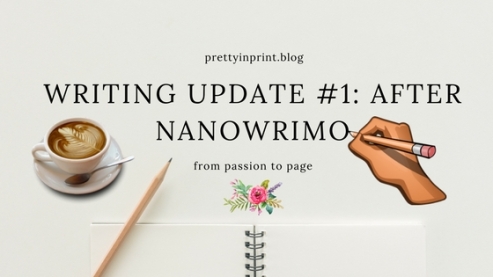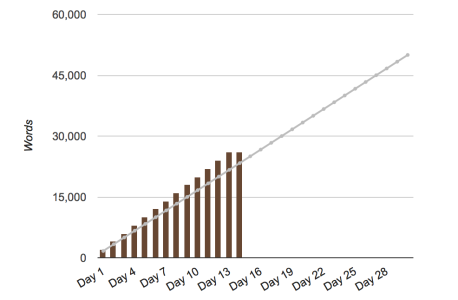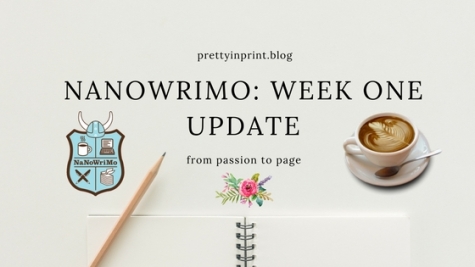
Writing a novel has been my dream for as long as I can remember. Ever since I picked up my first Junie B. Jones book in elementary school and fell in love with reading, I knew that writing was what I was meant to do with my life. I knew that I wanted to write something someday that inspired someone else as much as Barbara Parks inspired me.
Sometime a few years later, I made a promise to myself that I would write my own book before I graduated high school. At the time, it seemed so far off, and the books I wanted to write then are much different than the books I want to write now. It seemed like such a lofty goal at that age, and as my deadline started to approach this summer, it still felt so unachievable, especially with half a year left and nothing written.
So over the summer, I started my first novel. Long story short, it was terrible, and nothing actually happened in the 23,000 words I got written, so I abandoned that project for good. I was disappointed by this failure, but I wasn’t that quick to let my younger self down.
I started blogging about a month after my first failure, which introduced me to a whole community of writers who had their own experiences and advice to give, and I learned a lot. Most importantly, I was pulled into the hype of Nanowrimo, something I had tried in the past but never succeeded beyond a few words.
With the support of the blogging community behind me, I committed to writing 50,000 words in thirty days. I went into the month feeling nervous but excited, and I set my writing goal at 2,000 words a day. Overall, the experience was amazing. I had a few days where I wasn’t feeling up to it and I wanted to quit, but I knew that the feeling of finishing would outweigh the inconvenience of taking an hour or two of my day to just write.
And as a result of my persistence, I finished my novel and achieved my lifelong dream five days early, on November 25th. Needless to say, I was so proud of myself to have pushed through any obstacles and go after what I wanted. I kept my promise to my younger self with a month to spare, and I know little Bailey is smiling at me right now from somewhere in the past.
So with all that said, writing a novel at 17 was one of the most pivotal experiences in my life so far, and it taught me so many amazing lessons that I will carry with me as I go into any future projects.

1. YOUR FIRST DRAFT IS GOING TO SUCK
You’ve probably heard this about a million times by now, but I thought it might be nice to start off with this classic cliché. I’ve read this phrase on more blogs and Pinterest graphics than I can count, but those words never really meant anything to me until I began my novel-writing journey. My story sucks. It is really, truly terrible, but one thing I love about this phrase is that it reminds me that it’s okay that it sucks, because there is so much room for improvement and it can only get better from here.
2. IT IS IMPORTANT TO REMEMBER #1, BUT THAT DOESN’T MEAN THAT YOU SHOULDN’T TRY TO MAKE IT SUCK LESS
This is a mistake that I am unfortunately very guilty of. I went into my story knowing that it wasn’t going to be the best and that I had plenty of time to go back and edit it later, which allowed me to finish the first draft with less stress. However, when I started editing a few weeks ago, I realized that I may have let myself off the hook a little too much, and now my editing will suffer because of it. It’s okay to turn off your inner editor and just keep getting words on the page, but it’s also important to make sure the quality doesn’t slip too much because of it.
3. SHOW, DON’T TELL
I’m not proud to admit it, but this is my biggest issue in my writing. I try to play it through my head like a mantra as I write, I’ve even considered getting it tattooed in huge letters across my arm, but for some reason this concept just goes right out the window for me when I write longer works, and that makes all the difference between a good novel and one a kindergartener could write. This is never an issue for me when writing short stories, but for whatever reason when the word count is longer my descriptions go downhill, and that’s one thing I will definitely be working on in my next project.
4. SOMETIMES QUANTITY COMES BEFORE QUALITY, SOMETIMES IT DOESN’T
The main goal of Nanowrimo is pretty much just to get words onto the page as fast as you can, and that’s one of the things I love about it, but also one of its downfalls. In some instances, it’s better to just skip over some things (like detailed backstories, poems, or anything else that requires a great deal of time and effort), but sometimes quality should be prioritized higher. In the case of my story, my main character is writing a book of her own, but I mention nothing in the story about what her book is about. I planned on going back and adding that in later, but I realize now that her story could have affected major plot points and ultimately changed the course of the story, so I would have benefited from taking more time here.
5. WRITING A NOVEL IS HARD, BUT IT’S NOT NEARLY AS IMPOSSIBLE AS IT FEELS IN YOUR HEAD
Writing a novel always seemed like some far-off thing to me, something that somehow millions of other people managed to do but just wasn’t realistic for me. That mindset seems so crazy to me now, and I’m here to tell you that it doesn’t matter who you are, you are capable of writing a novel. It may seem like an insurmountable task, but once you get started it’s just putting words on a page from your heart. You can do it.
6. PLANNING IS NICE, BUT SOMETIMES YOUR CHARACTERS MAKE DECISIONS FOR THEMSELVES
When it comes to writing, I definitely categorize myself as a planner. I even wrote a whole blog post on why I chose to outline my story, but I may have failed to mention one important thing about planning: your plans will change. I had my whole story planned out chapter by chapter when I went into it, but once you start getting to know your characters better you start to realize what would be natural for them to do in certain situations. With my first draft finished, I now have 2+ characters that I wrote nothing about in my outline and a whole list of new plot points, and that’s okay. Planning is great, and I still swear by it, but sometimes the magic of writing is in giving your characters a little room to think for themselves.
7. YOU WON’T GET THROUGH IT IF YOU DON’T BELIEVE IN YOURSELF
This is definitely a big one, and part of the reason I didn’t finish my first novel attempt. If you don’t believe you can do it, or if you don’t believe it will be good enough, you just aren’t going to be able to push yourself to finish. While I was writing, doubts would pop into my head constantly because I knew what I was writing wasn’t the best or even worthy of being read yet, but I forced those thoughts out and pushed myself to finish anyway. Everybody is going to doubt their abilities at one point or another, and that’s okay, but it’s important to remember that it’s a learning process, and nobody is going to be a bestselling author overnight.
8. IF YOU THINK YOU DON’T LIKE COFFEE, YOU’RE WRONG
This one is a little different from my other tips, but also true. If you think you don’t like coffee or don’t need it to survive your writing, you probably just haven’t found the right kind of coffee (I recommend the Donut Shop k-cups, they changed my whole view on coffee). I waited until the third week of Nanowrimo to discover this and I wish I would’ve known sooner, so don’t make the same mistake as I did. Coffee makes everything easier, no argument.
9. PACING IS EVERYTHING
This is yet another thing I struggle with, mostly in my beginning chapters. I have a tendency to jump right into the story with only a few paragraphs of introduction, and when I read it over later it just sounds rushed and sloppy. I want to make a point to slow things down my next time around, paying attention to character and setting descriptions mixed in with a few back stories. Making sure your reader knows what’s going on and can picture it vividly can be the difference between them reading on and abandoning the book.
10. EDITING IS MUCH LESS FUN THAN WRITING
Being the perfectionist that I am, I was more than ready to jump into editing and wave my red pen freely over all my imperfections. Unfortunately, it only took about three pages for me to get so discouraged that I decided to put it away for awhile and revisit it later. I thought editing would be much more fun than writing and much less work, but it turned out to just be a big headache that I don’t really want to deal with. My best advice for this (though many people advise against it) is to every so often while you’re writing just go back and reread a few chapters. This can avoid a domino effect that comes from changing one thing early on and therefore having to change everything after it.
11. YOU MIGHT NOT WANT TO PUBLISH YOUR FIRST NOVEL
In most cases, your first novel isn’t going to be your best work or something that you’re going to want to present to a publisher (I don’t speak for everyone, but this is definitely true for me). Publishing is a daunting process to begin with, and when I decide I’m ready to give it a try I want to go in with something I’m confident in, and something I built from years of experience and plenty of failed novels behind me as a cushion.
12. DON’T LET BEING “TOO BUSY” HOLD YOU BACK
This is probably the most common excuse for not writing, but in most cases, it just isn’t true. Again I can’t speak for everyone, but most people can take at least five minutes out of their day to sit down and write. Any little time you put in will add up quickly until one day you have a complete story to hold in your hands. Whether you wake up and hour earlier and write or go to sleep an hour later, there are always little things you can do to work toward your goal.
13. TAKING BREAKS IS IMPORTANT
While it is important to make time for writing, it is just as important to make time for relaxing. If you’re constantly on the go working or going to school or taking care of a family and you use up all your free time writing, you’re going to burn out and you just won’t be happy. Just pace yourself and know your limits and every day you will make yourself a better writer.
14. SET REALISTIC GOALS AND REWARD YOURSELF FOR ACHIEVING THEM
My favorite way to take on a big project is to set little goals for myself and put in place rewards for when I meet them. For example, my goal for Nanowrimo was to write 2,000 words a day, and I would come up with rewards for every 10,000 words or so. They don’t have to be big things, it could be as simple as getting an ice cream or taking a break to walk your dog, just as long as it’s something you look forward to that will make you want to write.
15. WRITING A NOVEL IS A LOT MORE FUN WITH A COMMUNITY TO BACK YOU UP
Probably the best part of my Nanowrimo experience, and maybe the main reason I made it through it is because of the amazing community that comes along with this challenge. There are so many people going through the same thing you are at the same time, which gives you plenty of people to talk to and to motivate you. Without this blog and the Nanowrimo family to hold me accountable I probably would’ve given up in the first week. If you want to write and it’s not November, don’t worry! You can find like-minded people online or even ask your friends and family to hold you accountable for your word count every day, whatever it takes to keep you motivated!
16. WRITING A NOVEL IS SOMETHING TO BE PROUD OF
This is something that absolutely everyone should remember. I would even say print it out and frame it if you think that will remind you because you should never forget that you’re doing something amazing. Writing a novel is hard, and it takes a strong and determined person to push through all the obstacles that come along with it and keep fighting until you’re finished. Don’t be afraid to celebrate, this is a huge win.
17. THERE IS NO AGE LIMIT ON ACHIEVING YOUR DREAMS
Finally, it doesn’t matter how old or young you are, your novel doesn’t know your age. Whether you’re five or ninety-nine, it’s never too late or too early to work hard for what you want. I always kind of thought in the back of my mind that only adults could write books, but I realize now how wrong I was. People of different ages have different stories and experiences to bring to the table that nobody else can. No matter how old you are, your story deserves to be heard.

This post is probably the longest one I have ever written, but it is also one that I have been excited about writing for months now. I’m so glad I got the opportunity to share with you what I’ve learned from my writing, and I hope you can learn something from it too.
I’d love to hear any advice you’ve picked up from your own writing experiences, so please let me know in the comments anything you have to share.
Happy writing,









